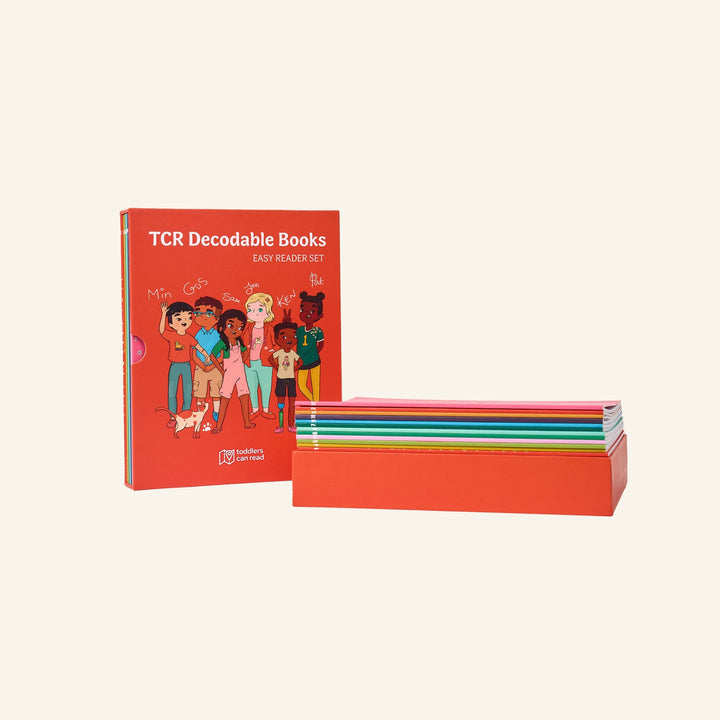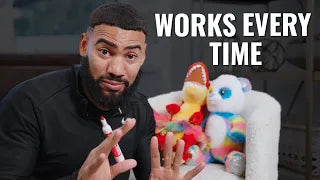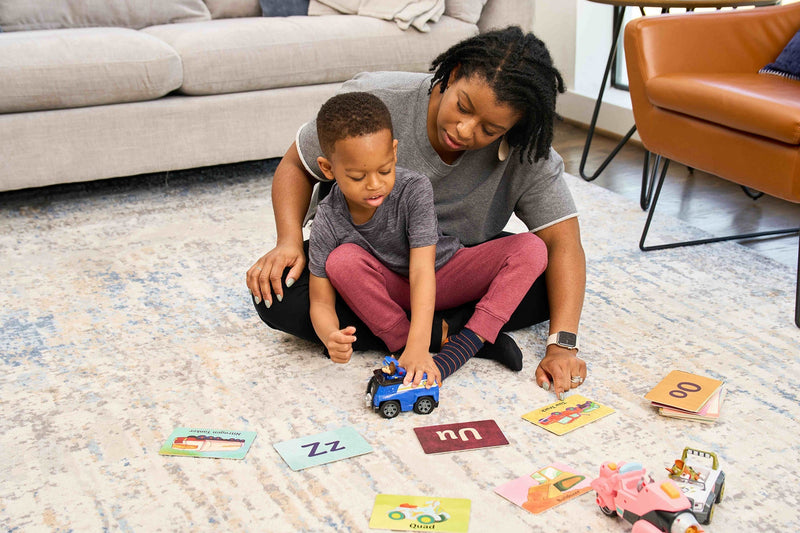In part 1 of this series, we learned that toddlers CAN, in fact, learn how to read. IF (and this is a big IF), they are taught how to do so.
But that begs the question: "OK, even if toddlers can read... is it even developmentally appropriate to teach a toddler how to read?"
Or, if you're asking this question on TikTok, it might look something like:

So in this part 2 post, I'll answer each of these questions (and more!), so you can make the best choice for when and how to teach your little one to read.
What Social Media Tells You
It's not uncommon to hear someone say that teaching a child to read before 6-7 years old is "developmentally inappropriate." In fact, this is the most common reason I hear folks give for why they oppose teaching toddlers to read.
And it doesn't help that many of the biggest and most influential toddler parenting accounts have explicitly said that it's not appropriate to teach your child to read before kindergarten. They'll use the terms "developmentally appropriate" and "developmentally inappropriate" to tell you (the child's parent) what's right and what's wrong for your little one's development.
This sort of messaging is not only misleading because of the lack of supporting research, but it also plays right into one of every parent's biggest fears: that something we're doing NOW could permanently harm them LATER.
However, the term 'developmentally appropriate' is used so often and so loosely that the actual meaning of what is or isn't developmentally appropriate almost always gets lost.
But in this post, we're not going to do that. As my 4-year-old son always says, "Not today, Zurg!"

How can parents tell whether something is developmentally appropriate?
Well, to put it simply: What is or isn't developmentally appropriate is based on the knowledge we have (not the assumptions we make) of how children learn and develop.
Essentially, it requires us to think about whether the things we're doing with our children are supported by research on how children develop at various ages and stages. And this should always be considered within the context of a child's societal, community, family, and cultural values and priorities.
Why is it so important to use developmentally appropriate practices?
Well, for a lot of reasons. But maybe the most important of which is to reduce the stress placed on our child. Because when a child is taught in a way that they aren't ready for, it causes unnecessary stress that can interfere with their development:
"When young children are asked to learn content with methods contrary to their natural learning style, they experience a natural conflict between their desires and the systems imposed and expected by adults. In denying their natural instincts in order to win adult approval, children must make enormous efforts to suppress and control their behavior. An example is the five-year-old boy who seems physically unable to sit and listen as the teacher asked him to, or the eighteen-month-old who is driven to climb and is removed every time she does so. This is true stress." Carol Gestwicki
So on a surface level, this concept seems pretty simple: don't cause stress. But the truth is, it's far less black and white.
How does "developmentally appropriate" vary from child to child?
For one thing, what's developmentally appropriate for one child may not be appropriate for another child. This is due to the fact that children develop at different rates and in different contexts. Just to list a few examples: children do not grow up in the same homes, attend the same schools, live within the same communities, or have access to the same resources.
In Professor of Education Bruce Mallory's critique of 'developmentally appropriate practice, he cites that "the current conceptualization of what is appropriate in early childhood education is overly narrow in its interpretation with respect to variations in cultural and developmental diversity."
More simply: using a more rigid "one-size-fits-all" set of rules to define what is and isn't developmentally appropriate does NOT take into account the various individual differences between children.
Additional Examples of Differences in Children
This is supported by the fact that children's brains develop differently based on a ton of different factors. To provide just three examples:
- NEURODIVERGENCE: If we compare a child who is neurodivergent to a child who isn't, we know their brains won't be developing in the same way.
- FAMILY INVOLVEMENT: Children whose families are more involved in their education at home and in school have been shown to develop better receptive and expressive language skills.
- INCOME: There's growing evidence to suggest that poverty can have a serious impact on a child's brain development and cognitive ability.
This is all to say: Claiming that learning to read is "developmentally inappropriate" for ALL children up to a certain age is a HUGE generalization that we just can't make. Especially considering what we know about how children's brains develop.
It simply doesn't make sense to group together every child under the age of 5 or 6 and say whether they will or won't be ready for every developmental milestone at the exact same time.
HOW we teach our kids to read matters... a LOT.
Ultimately, when we talk about whether teaching your child to read is developmentally appropriate: we shouldn't make these sweeping generalizations and say: "Oh, they're just not old enough yet!" Instead, we should be focused on HOW we are teaching them each skill.
And every early childhood educator or parent I know (myself included) believes in a couple of key factors here, like not forcing your child to sit still (ESPECIALLY for a long period of time) and incorporating learning through play.

Incorporating play into learning time keeps kids engaged and keeps activities developmentally appropriate!
And this makes sense when you consider that play is one of the most effective methods to use to teach children. When we use play to teach our little ones how to read, we engage them in dynamic, multi-sensory, interactive, and imaginative activities that will spark intrinsic motivation.
"Undoubtedly, play has significant advantages for children that include fostering reading ability and sustaining their interest in reading and literacy." (Ali, Aziz, Majzub)
Meaning: there are ways to make learning to read fun. There are ways to engage our kids. And like anything we teach: there are ways to make the process of learning to read either more or less developmentally appropriate based on HOW we do it.
That's why I'm never going to tell you to teach your toddler to read by having them sit still, focus for long periods of time, or doing 'drill and kill' activities. I know that many of our memories of learning how to read involve sitting quietly in a classroom, filling out some worksheet or practicing some sight word list. But we can do better for our little ones.
And I'm never going to tell you that you need to- or even should- teach your toddler to read. Period. That's your decision as the parent based on what you want and what you think is best for them. (And if you do decide you're ready to start teaching your little one to read, I have a great free Beginning Reading Workshop that's a great place to start.)
But, since we've answered the question of can toddlers actually read and we've discussed some of the major issues with calling early reading "developmentally inappropriate" (it's only inappropriate for your child if you make it inappropriate for your child,) part III will tackle the biggest lingering question:
Why in the world would anyone teach their toddler to read?
And I know I share a lot of personal examples of this on social media, but I think you'll understand it best coming directly from other parents. And I have lots of examples to share. Stay tuned!
SOURCES:
Developmentally appropriate practice: Curriculum and development in early childhood education by C Gestwicki
Is Developmentally Appropriate Practice for Everyone? By Sally Lubeck
Diversity & Developmentally Appropriate Practices: Challenges for Early Childhood Education. By Mallory, Bruce L., Ed.; New, Rebecca S., Ed
Poverty, Stress, and Brain Development: New Directions for Prevention and Intervention by Clancy Blair and Cybele Raver
Children's acquisition of early literacy skills: examining family contributions (board)
Autism and Brain Development by Christopher Walsh, Morrow, and Rubenstein
Teaching and Learning Reading Through Play by Aliza Ali, Zahara Aziz and Rohaty Majzub









